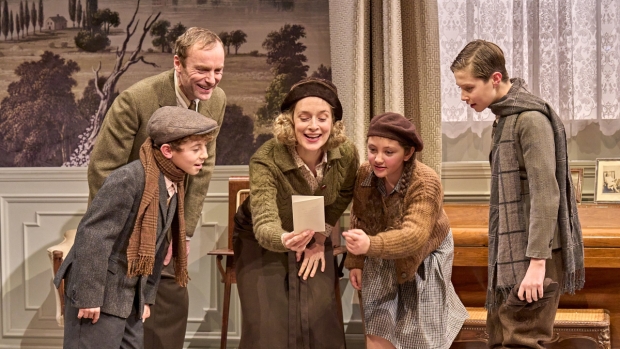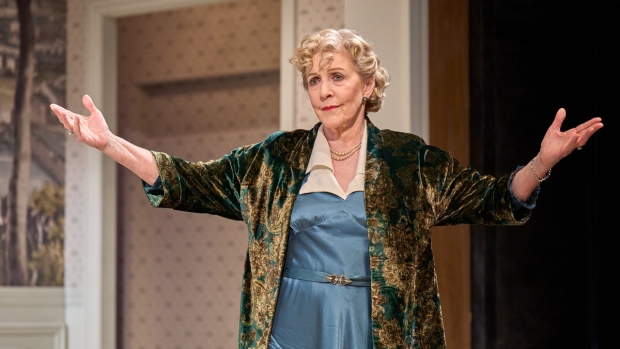”Watch on the Rhine” at Donmar Warehouse – review

© Manuel Harlan
Its plot is relatively simple. Sara (Caitlin Fitzgerald), the daughter of a wealthy Washington family, returns home from Germany after 20 years away. She brings with her a German husband Kurt (Mark Waschke), and three preternaturally sophisticated children. While her mother Fanny (played with anxious hauteur by Patricia Hodge) and brother David (Geoffrey Streatfeild) greet her with wary affection, another refugee in the house, a Romanian count Teck (John Light) down on his luck encounters them with suspicion.
While his wife (Carylss Peer) is confessing her love for David, Teck is playing poker with fascist sympathisers and keeping an eye on the main chance. He quickly sees a way of improving his fortunes by passing on information on Kurt, an anti-fascist who is deeply involved in the German resistance to Hitler. What unfolds is both a physical and a moral conflict about the need to take a stand – a clear metaphor for America’s reluctance to involve itself in the Second World War.
Black and white slides at the beginning and end of the production make the play’s significance chillingly clear. The date it is set is crucial: the action takes place in July 1940 and the US only enters the war in December 1941.
All of this makes Watch on the Rhine pertinent historical viewing. It is riveting to see Hellman without the benefit of hindsight, making her plea for her country to fight against fascism and to choose good over evil, via Kurt’s noble stance and his heroic commitment to put his own life and family in the balance. “My children are not the only children in the world,” he says.

© Manuel Harlan
The play still feels urgent, but its difficulties arise because of its form and the way Hellman chose to handle the subject matter. She was both Jewish and Communist, yet the only time Jewishness is mentioned in her play is to explicitly explain that Kurt is not Jewish. He has somehow to stand for all the resistance to Hitler without ever mentioning a prime reason to fight.
This too springs from the circumstances of the writing – Hellman did not want to be accused of special pleading, especially since a strong strand of antisemitism was part of the reason that America was holding its neutral position. But it surrounds the play with a whiff of untruth, which subtly undermines its powerful warnings about the dangers of unopposed extremism.
It’s also written very much as a drawing room comedy which gradually morphs from a family drama about a homecoming after a period of estrangement – full of witty lines from the all-knowing servant Anise (an excellent Kate Duchêne) and fractious squabbling between mother and son – into a more melodramatic and tragic struggle.
Director Ellen McDougall doesn’t quite resolve the tension; there are moments when you sense her struggle in matching her commitment to the play’s subject matter with its inert, traditional form. Basia Bińkowska’s setting almost makes the issue concrete, combining an elegant drawing room, covered with a wallpaper view of the Rhine, with a more stylised frame.
But there are excellent performances from Streatfeild as the unhappy son, and from Waschke, bringing shafts of realism to the heavily metaphorical Kurt. Fitzgerald too as Sara has to be unrealistically self-sacrificing and self-possessed which she does with some conviction while David Webber weaves something out of absolutely nothing as the black butler Joseph.
For all its oddity, and over-writing, the play grips. It’s rare to feel you are watching a plea from the frontline of history. This alone makes Watch on the Rhine worth reviving. It may not come back for another 40 years, but it feels like an important piece in the history of theatre.











